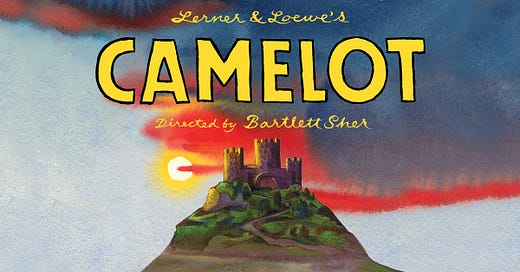Sometimes a musical is so good it hurts. I was too young to have seen Burton/Andrews/Goulet in Alan Jay Lerner and Frederick Lowe’s original Camelot in 1960, but I can’t imagine they hurt audiences more deeply than Andrew Burnap, Phillipa Soo and Jordan Donica are hurting them right now over at Lincoln Center Theater. It is a hurt inflicted via rhapsodically gorgeous singing and acting of the most penetrating intimacy, in service to one of the more melodic Broadway scores ever written. Personally, I would luxuriate in it forever but that might constitute musical theater masochism.
According to legend, lore, and a good number of our current theater critics, Camelot is a musical with a problem: Lerner’s book. I disagree. I’ve always found Camelot more than compelling. Still, the estimable Aaron Sorkin was brought in to perform reconstructive surgery for LCT’s revival. I’ve never closely studied Camelot’s original script, and have no interest in sourcing every last Sorkin emendation. His renovation satisfies. It is smart, at times blithely witty in a contempo-Sorkin-speak that did not bother me because it made the characters seem smarter too. It is often searingly dramatic. Finally, and fundamentally, it is heartbreaking. Camelot is the story of a love triangle between friends, as well as lovers; a story of erotic love betraying fraternal love. It is, at bottom, a tragedy of love unspoken. Woven into the magnificent tapestry of Camelot’s musical landscape, that tragedy… hurts.
What this production has not done is make Camelot a perfect musical. No musical is. (A lifetime of loving musicals has revealed this to me.) In fact, I would argue that the imperfections in a great musical are often part of what makes it great. Music is primary, of course; a great score is all. Beyond that, imperfect characters add discomfiting dimension: Oklahoma’s disturbingly violent Judd Frye; Carousel’s torturously abusive Billy Bigelow; boorishly obstinate Professor Higgins in My Fair Lady; the ruthless narcissism of Mama Rose in Gypsy; the predatory seductiveness of Bruce, the Dad, in Fun Home. Conflicted Alexander Hamilton himself, for God’s sake. And let us not forget Sweeney Todd.
“Perfect musicals” are a chimera. Guys and Dolls certainly is a lark, but those are all bad guys, in truth — we embrace them and their gloriously twisted syntax at our peril. Beloved A Chorus Line is a cavalcade of profoundly (if triumphantly) damaged souls.
King Arthur, Queen Guenevere, and her knight Lancelot all occupy their own moral high ground in Camelot. This rigid moral perfection is also their imperfection, nearly destroying each of them. Director Bartlett Sher has heightened these triangulated imperfections by ingeniously staging Camelot as an almost constant triangle in motion. Michael Yeargan’s sets, so sumptuously evocative, also physically trap our imperfect triangulists again and again. Fortunately they are costumed (by Jennifer Moeller) in some of the most breathtakingly attractive gowns and armor that I’ve ever seen on a Broadway stage, lending entrapment luster.
Then there is that orchestra, all 30 pieces (thank you, LCT and Bart Sherr), playing Robert Russell Bennett and Philip J. Lang’s’s original orchestrations with such majesty that…it hurts. All of the principals bring vulnerability and compassion to roles that usually are much more stentorian. This hurts too. Jordan Donica’s heart-rending “If Ever I Would Leave You” hurts the most.
What can I say? Camelot is nominated for five Tonys, come Sunday.
It isn’t enough.
Ow!




